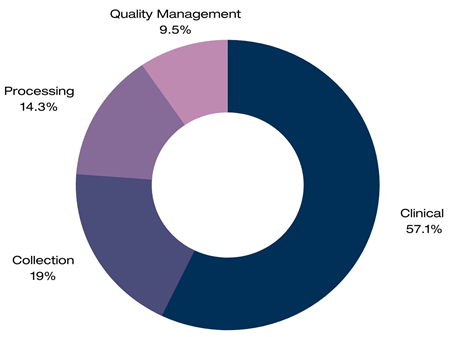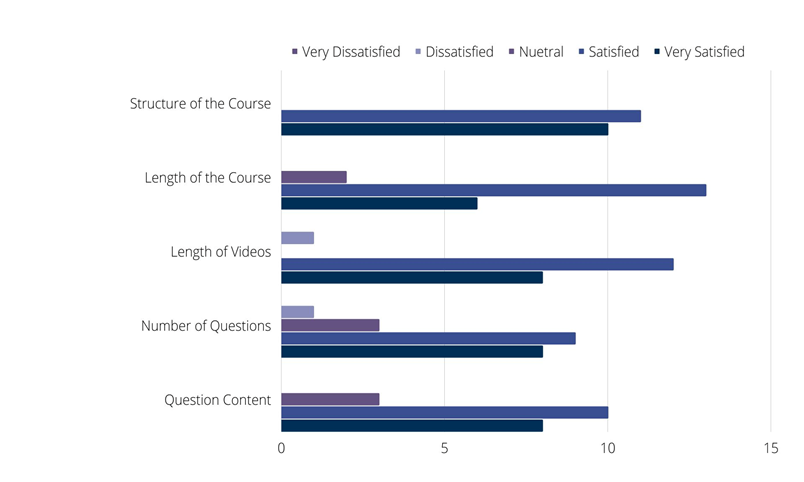JACIE Inspectors
Tuula RintalaDirector, Quality of Care and Advocacy
EBMT, European Society for Blood and Marrow Transplantation
Barcelona, Spain
Inspectors are the backbone of the JACIE Accreditation process. Our inspectors are volunteers who give their time and expertise to develop the transplant & cellular therapy community. Inspectors are trained to inspect their specific areas of expertise matching the JACIE Standard e.g Clinical, Collection, Processing and Quality Management. The criteria for the inspectors is listed in
Table 1 below. The inspectors are asked to commit to two inspections a year, working around their availability.
Table 1. Eligibility criteria for JACIE inspectors by Scope.
|
Clinical Programme Inspector
|
- The inspector shall hold a medical degree, be currently licensed to practice medicine, and be specialist-trained and certified in one of the following: Haematology, Medical Oncology, Paediatric Immunology, or Paediatric Haematology/Oncology.
- Evidence of a minimum of five years of clinical blood and marrow transplant experience in a consultant/specialist role (periods of intern/resident training are not considered). JACIE may request a clear breakdown of periods managing transplant patients and/or written confirmation of experience from a supervisor.
|
|
Haematopoietic Progenitor Cell Collection Facility Inspector
|
- The inspector shall hold a medical degree or degree in a relevant science and five years experience in haematopoietic cell collection procedures, including apheresis. If a physician, be currently licensed to practice medicine.
- Or, shall have five years experience as the nurse or technician supervising the collection of peripheral blood progenitor cells by apheresis.
|
|
Cell Processing Laboratory Inspector
|
- The inspector shall hold a medical degree or PhD or a professional degree in biological sciences or medical technology.
- Five years experience as a Laboratory Director, Medical Director, or Supervisor of an HPC Laboratory.
|
|
Quality Management Inspector
|
- The inspector for Quality Management shall have 3 years experience as a Quality Manager in an accredited centre or in preparing a centre for accreditation.
- Provide a letter from the Programme Director confirming this experience.
- Be able to show evidence (documented) of continuous education and training in quality management. This can include internal and external training.
|
The professional development gained as an inspector is invaluable. The inspectors build a professional network within the inspector community and also have their role visiting transplant centres/facilities learning and sharing best practices within the field.
There are benefits for the Centres as well. Should your Centre apply for JACIE Accreditation, the Centre will qualify for a 15% discount for one active, and 20% discount for two or more active inspectors in their Transplant Programme.
Changes to the Inspector training course
The Covid-19 imposed pause in JACIE Inspector training, gave the JACIE team an opportunity to review the inspector training format. As a result, the training was divided into two distinct parts to allow trainees to focus on the process and the Standards through e-learning modules and then have a more practically focused, face-to-face workshop.
The e-learning modules were developed to cover all sections of the Standards as well as the JACIE process presented by experienced JACIE inspectors and experts. There is a short quiz at the end of each module to cover key learning objectives. The completion of the e-learning modules is a pre-requisite for attending the face-to-face workshop.
The one-day workshop focuses on the more practical aspects of the inspection: how to prepare for the inspection and find the evidence, interview techniques, as well as the post-inspection tasks – completing the inspection checklist and the report. The aim of the workshop is to ensure that the inspectors have a good understanding of their role and feel confident about the different processes and tools used. There is also an opportunity to ask questions and share knowledge with experienced inspectors and the JACIE office staff. The first workshop in the new format was facilitated by the JACIE Inspectors Committee and supported by the JACIE office.
Finally, the trainees will undertake an Inspector exam on the Standards relevant to their area of expertise and the scope that they will be inspecting. When some of the trainees qualify as an inspector for more than the area of the Standards, they will need to pass the exam for all relevant sections. Once the trainees have passed their exam, they will be assigned to an inspection team as an observer before being added to the active inspector list.
Inspector Course in Castelldefels 17th November 2022
The first onsite workshop – part of the JACIE inspector training –since the pandemic, took place just outside Barcelona, in Castelldefels, 17th November 2022, which addressed finding the evidence onsite/virtually, and the reporting process.
Nineteen (19) trainees, some of whom had applied almost three years earlier, across Europe attended the day workshop from Finland to Italy; and the UK to Czech Republic. Most of the trainees had applied as Clinical Inspectors, with only 9.5% of the trainees identifying as Quality Management trainees. As some of the trainees identifying as Clinical Inspectors may also be eligible as Collection/Processing/Quality Management Inspectors, the final distribution of the inspectors is likely to look slightly different e.g. JACIE gains more inspectors than this figure suggests.
Figure 1. Distribution of trainees by Scope

The sessions were led by the members of the Inspector Committee, with the speakers sharing their top tips on preparation and managing the inspection process. In the course of the day, the trainees also had an opportunity to review some materials to identify potential areas for further discussion in the pre-inspection teleconference in a simulation exercise.
Evaluation and next steps
Although the evaluation of the full training programme in the new format is not yet available, it was reassuring to see that the evaluation of the e-learning component was overall positive. We estimated that the completion of the e-learning modules would take approx. four and a half (4.5) hours in total, but for some trainees, this time was significantly longer. As all the modules are provided in English, we are aware that for some trainees, the language was a challenge. The modules are accompanied by the slides and a transcript of the video to mitigate this to some degree, but reviewing these would inevitably add to the length of time it takes to complete the course. It is important that the evaluation of the full course format is completed before making further changes to the training.
Figure 2. Evaluation of the E-learning modules

As JACIE still has a waiting list of trainees who have applied during the pandemic and, therefore, JACIE is planning to run another course in the first quarter of 2023. In addition, JACIE is in discussions of running a course in French later in 2023 as well as a further course in late 2023.
For more information on how to become an inspector, please visit our website:
https://www.ebmt.org/inspectors/how-become-inspectoror email us:
inspectors@ebmt.org
#RegionalandPartnerUpdates